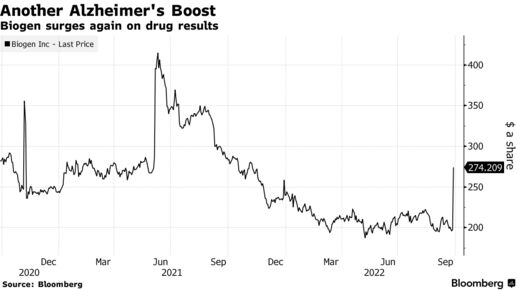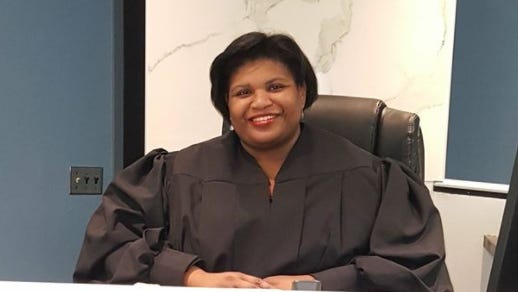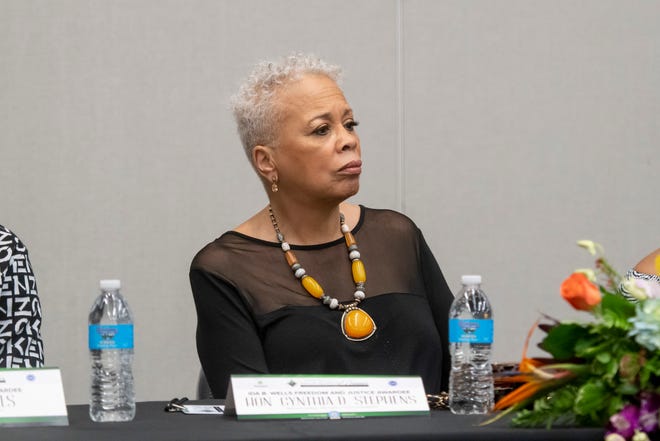By David J. Neal
Crime, misappropriating funds to a friend’s business and having a drink got attorneys from Miami-Dade, Broward and Palm Beach counties onto the Florida Bar’s monthly list of state Supreme Court discipline.
Most of these attorneys have appeared in the Miami Herald previously for their violations of law or ethics.
In alphabetical order:
Mary Hudson, Palm Beach Gardens
The Florida Bar says Mary Hudson (admitted to the Florida Bar in 2011) has been ghosting it since 2019.
Hudson didn’t answer any of the three letters and three emails over three dates regarding a 2019 Bar complaint filed against her. She let her firm, Maverick Law, be administratively dissolved in September 2019 by not filing the annual report with the state. When a Bar investigator went to Maverick Law’s PGA Boulevard address, the investigator was told Hudson hadn’t been there in four years.
Hudson was suspended in February. As the Bar received no notification that she informed clients, opposing counsel, tribunals, all bar associations of her suspension, that counts as contempt and Hudson received another 91-day suspension.
Julio Martinez, Miami Beach
In July 2021, Julio Martinez (admitted 2010) stated in a consent judgment that he has a substance-related disorder and would enter a two-year rehabilitation contract with Florida Lawyers Assistance, which helps attorneys who have substance abuse or mental health problems.
The contract, which Martinez began Dec. 14, required abstinence regarding alcohol as part of staying away from “all mood-altering substances, including prescribed medications ... and any beverage, food, or non prescribed medication containing alcohol … including without limitation “non-alcoholic” beer, wine, cold medicines, and allergy medications.”
That’s the Florida Bar’s contempt petition, filed after, the Bar said, Florida Lawyers Assistance said Martinez tested positive on April 19.
In his response to the Bar’s petition, Martinez admitted to having a “minor amount of alcohol on a dinner date just prior to the screening.” The response also pointed out Martinez had tested cleanly 10 times, seven times before the failed test and three times after.
The Bar wanted a 91-day suspension. Martinez, in his response filed by attorney Kevin Tynan, asked for the appointment of a referee to hear this contempt case.
The state Supreme Court didn’t appoint a referee, but didn’t give Martinez a 91-day suspension, either. His 30-day suspension starts Sept. 16.
Stefan McHardy, Pembroke Pines
Stefan McHardy (admitted in 2011), a former real estate attorney, was disbarred last year for ignoring his suspension by holding himself out as a lawyer and dispensing legal advice while suspended.
Even after the disbarment, at listinglawyer.com, McHardy billed himself as “Stefan McHardy, Esq.” That appears to be gone now, but at that site and on various social media platforms, McHardy still calls himself “Listing Lawyer.” The Florida Bar says he still gives legal advice. McHardy’s site says he “brings eight years of experience as both a real estate agent and a real estate attorney.”
According to the Florida Department of Business and Professional Regulation’s online records, McHardy is a real estate agent whose license expires Sept. 30. According to the state Supreme Court, McHardy’s not just disbarred, he’s permanently disbarred.
Arthur Morburger, Miami Beach
Big Tobacco attorney Arthur Morburger (admitted in 1973) has been under emergency suspension since June 2021.
After a case involving Morburger’s client, Philip Morris, and the estate of a dead smoker represented by Coral Gables attorney Carl Palomino, Palomino was supposed to receive $19,000 in fees from Morburger. A Florida Bar investigation found that $19,000 was rerouted by Morburger via a series of checks to Gisselle Manzzo’s GM Investment Property & Solutions.
Morburger claimed in a letter to the Bar that he had “no knowledge” of GM Investment, which state site Sunbiz.org says Manzzo registered with the state Jan. 8, 2019 — two months before Morburger handled an appeals case for Manzzo. The Bar investigator said Manzzo refused to talk to him per Morburger’s request. (Manzzo also declined to comment to the Miami Herald).
The report by the referee, 11th Circuit Criminal Judge Michelle Delancy, said through the final hearing Morburger stayed with his claim that he knew nothing about GM Investments connection to Manzzo “until much later” and he was an “innocent victim” in all this.
“He stated that he did not apologize to Mr. Palomino because he did not think he had done anything wrong,” Delancy wrote. “[Morburger] has therefore failed and refused to take any responsibility for his failure to reasonably protect the funds entrusted to him — before and/or after he was informed that the (trust) account was compromised.”
Also, Delancy wrote, Morburger’s “innocent victim” claim gets undercut by the evidence and his “numerous misrepresentations” during the Bar’s investigation and the final hearing before the referee.
“In clearly incredulous testimony, [Morburger] asserted he made two single attempts to look up GM Investments on Sunbiz, but that the website was not operating properly on either occasion,” Delancy wrote.
Florida attorneys are familiar with Sunbiz.org, the state site listing all corporations registered to do business Florida, which is why Delancy wrote Morburger’s claim “defies common sense.”
That also ran against Manzzo’s deposition testimony about her relationship with Morburger. She helped at his law practice, she said, which he used to run out of her home. He celebrated holidays with her and her family. In her deposition, she said she spoke with Morburger about becoming in-house counsel for GM Investment (which Sunbiz says was dissolved in September 2021). That’s why the checks went to her business account, Manzzo said. They were going to set up a shared office space.
Also, Delancy noted, the check that settled up a Bar delinquency of Morburger’s came from Manzzo with “GM Investment” written across the top of the check.
Though Morburger’s paid the $19,000 he owed Palmonino, Delancy said Morburger did so only after being held in contempt of court and weeks before the final hearing. Morberger’s lies and fact that the misappropriated funds went to “his dear friend Manzzo” tagged him as complicit in the financial shenanigans.
“Accordingly, it is clear that Respondent is guilty of failing to safeguard trust funds, of making misrepresentations or engaging in fraudulent, deceitful or dishonest behavior, and of failing to hold and use trust funds only for the purpose for which they were entrusted,” Delancy wrote.
She recommended disbarment. The state Supreme Court agreed. The 85-year-old was disbarred on Aug. 25.
Erika Muller, Fort Lauderdale
The referee’s report says Erika Muller (admitted in 2008) didn’t participate in the disciplinary process to save the career she’d built. Then again, the report describes Muller taking a flamethrower to that career by lying to opposing counsel and her own clients, and presenting photocopies of checks as actual checks, then admitting to everything in an affidavit to her law firm.
That’s the firm of Cole, Scott & Kissane, where Muller was a partner and handling client Rooms To Go, which was the defendant in a lawsuit. Rooms To Go and Broadspire, an adjuster for Rooms To Go’s insurer, talked mainly to Muller.
Muller showed up to a Nov. 5, 2020, hearing with an independent adjuster supposedly for Rooms To Go and claiming she had authority to settle (she didn’t). That didn’t prevent her from entering into a $325,000 settlement in December. The plaintiff signed the release in January, an unauthorized release because Muller didn’t have settling authority. That also means she couldn’t come across with the money.
So, on March 4, 2021, the referee’s report said, she “sent plaintiff’s counsel a photocopy of what purported to be a settlement check from Broadspire for $375,000.00. The check was fabricated by [Muller].”
The peeved plaintiff filed several motions concerning orders to enforce the judgment, which ended in a final judgment of $425,000 on March 22, 2021. After the plaintiff’s attorney moved for two writs of garnishment and issued post judgment discovery, Muller promised to wire the $425,000 to the other side. When that didn’t happen, the referee’s report said, she agreed on April 2 to pay $550,000 to stop execution and garnishment proceedings.
Muller pulled the same altered photocopy check move she had earlier. Meanwhile, she was telling Rooms to Go that the case was being set for mediation and even showed a fake notice of mediation.
Both Muller and the plaintiff’s attorney’s informed Muller’s firm of her conduct. The referee’s report says Muller’s affidavit claimed she was going through a mental health crisis at the time.
She’s been disbarred.
Marc Reiner, West Palm Beach
Lawyers have continuing legal education (CLE) requirements. They have to sit through classes, either in person or online (screen popups keep them from leaving the screen).
After Reiner (admitted in 2008) was declared delinquent in keeping up with his CLE in January 2018, he continued to practice law. But, in June 2018 when he petitioned for CLE requirement removal, he “certified that he had not engaged in the practice of law during his delinquency.”
A referee found the Bar didn’t prove the main client complaints in two other grievances, but did find Reiner wasn’t particularly attentive to Florida Bar requests.
The Bar wanted a six-month suspension, FLA evaluation and reimbursement of $3,042. Reiner’s attorney, Kevin Tynan, argued for a 30-day suspension, completing the Bar’s ethics school, three more hours of CLE and paying the Bar’s costs.
The state Supreme Court went with the referee’s suggestion of a 90-day suspension, six hours of a continuing legal education course on professionalism and pony up $3,023. Reiner’s suspension starts Sept. 24.
Richard Waserstein, Bay Harbor Islands
Richard Waserstein (admitted in 1986) traded Florida Bar No. 604380 and an office on Kane Concourse in Bay Harbor Islands for inmate No. 10596-509 and a place in the Federal Correctional Institution in Otisville, New York.
Waserstein, 60, used to own Second Chance Detox, which did business as Compass Detox, and WAR Network. Compass provided inpatient, residential detox services while WAR provided outpatient services and partial hospitalization. That was the front, anyway.
Waserstein’s guilty plea to conspiracy to commit money laundering admits patient brokers offered “patients” bribes and kickbacks to go to treatment, “including cash, free interstate flights, drugs, and alcohol.
“Patients improperly induced to attend Compass Detox and WAR were then recycled through Compass Detox and WAR multiple times in order to continuously bill private insurance companies for supposed addiction treatment, even though some patients received little to no legitimate addiction treatment or therapy.”
Waserstein scored $2,701,090 from the insurance companies and a 13-month sentence.
Waserstein decided to beat the Bar to the punch and apply for disciplinary revocation without leave to apply for readmission, essentially permanent disbarment. That application has been accepted.
Full Article & Source:
Lawyers’ fake rehab, fake checks, missing real money — from Miami Beach to Palm Beach

















